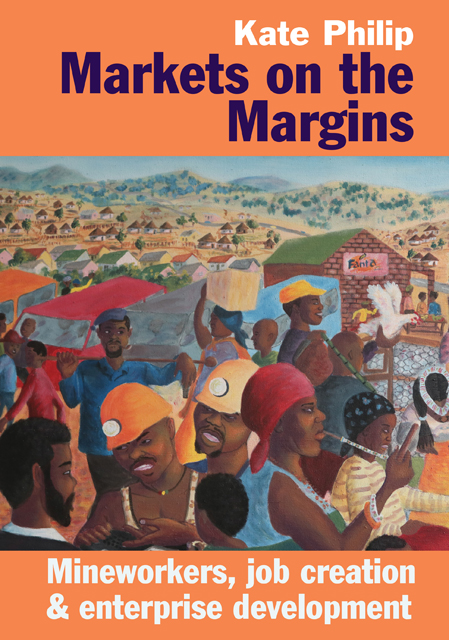Book contents
- Frontmatter
- Contents
- List of Illustrations
- Preface
- Acknowledgements
- Abbreviations
- 1 Introduction: Setting the scene
- 2 The 1987 Mineworkers Strike
- 3 Conflict in the Transkei
- 4 Power Struggles in Lesotho
- 5 Co-ops Capture the Imagination
- 6 The NUM Co-op Programme
- 7 Challenges of Democratic Ownership & Control
- 8 Rethinking Degeneration in Co-op Theory
- 9 The Mineworkers Development Agency’s Development Centre Strategy
- 10 Small Enterprise: In the shadow of the core economy
- 11 A New Enterprise Development Paradigm
- 12 Market Development – or a New ‘Anti-Politics Machine’?
- 13 Breaking into Higher-value Markets in the Craft Sector
- 14 Marula: Product innovation & value chains
- 15 Implications for Enterprise Development Strategy
- 16 If Markets are Social Constructs, how Might we Construct them Differently?
- Select Bibliography
- Index
6 - The NUM Co-op Programme
Published online by Cambridge University Press: 20 January 2023
- Frontmatter
- Contents
- List of Illustrations
- Preface
- Acknowledgements
- Abbreviations
- 1 Introduction: Setting the scene
- 2 The 1987 Mineworkers Strike
- 3 Conflict in the Transkei
- 4 Power Struggles in Lesotho
- 5 Co-ops Capture the Imagination
- 6 The NUM Co-op Programme
- 7 Challenges of Democratic Ownership & Control
- 8 Rethinking Degeneration in Co-op Theory
- 9 The Mineworkers Development Agency’s Development Centre Strategy
- 10 Small Enterprise: In the shadow of the core economy
- 11 A New Enterprise Development Paradigm
- 12 Market Development – or a New ‘Anti-Politics Machine’?
- 13 Breaking into Higher-value Markets in the Craft Sector
- 14 Marula: Product innovation & value chains
- 15 Implications for Enterprise Development Strategy
- 16 If Markets are Social Constructs, how Might we Construct them Differently?
- Select Bibliography
- Index
Summary
Against the backdrop of the power struggles in the Eastern Cape and Lesotho described in earlier chapters, four new NUM co-ops finally went into production during 1989. In South Africa, these were in the Transkei, in Qwe Qwe (outside Umtata) and in Flagstaff; in Lesotho, they were in the small towns of Quthing and Leribe. These co-ops represented a rather steep learning curve for NUM, in which most of the kinds of problems experienced in the early 1900s in the ‘associations of producers’ described by the Webbs and discussed in the previous chapter were manifest in stark forms – along with quite a few they could never have anticipated.
With the first four co-ops just up and running, the pressure to roll out more was already intense, with NUM embarking on a co-op expansion strategy focused on establishing agricultural production co-ops in every district of the Transkei and Lesotho. This expansion phase was supported by funding from the European Union through a local entity called Kagiso Trust. This allowed the NUM Co-op Unit to rapidly enhance its staff capacity with a mix of ex-miners, professional financial managers and specialist agricultural capacity.
In this period, the Co-op Unit was exposed to the more established co-op movements in Zimbabwe and Botswana, where experience and thinking on the issues was far ahead. We drew from this experience by recruiting James Sarakusebwa from the Co-operative Self-Finance Scheme in Zimbabwe. Over this period, in 1990, the ANC and the South African Communist Party (SACP) were unbanned; a range of staff members with specialist skills were drawn from amongst these returning exiles.
NUM’s Co-op Forum – comprised of representatives from each co-op – became a platform for significant inter-co-op learning and exchange. With meetings translated routinely into three languages at least (isiXhosa, seSotho, sometimes English and sometimes seSwati) these meetings tended to extend through the night. The debates were intense, with co-op members’ passion for participation unflagging through to dawn.
This was all taking place against the backdrop of history in the making, as political leaders started to be released from prison and as the constitutional negotiations began, along with negotiation between the ANC, the Congress of South African Trade Unions (COSATU), the SACP and other democratic formations over the content of the Reconstruction and Development Programme envisaged for the post-apartheid period.
- Type
- Chapter
- Information
- Markets on the MarginsMineworkers, Job Creation and Enterprise Development, pp. 50 - 68Publisher: Boydell & BrewerPrint publication year: 2018



